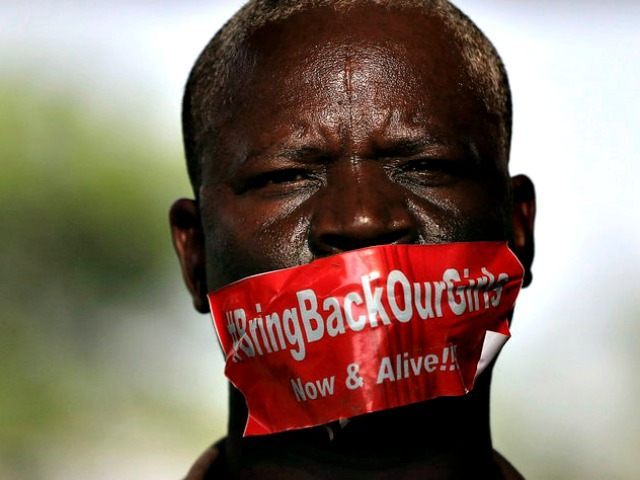In what is appearing to have been an especially active Sunday for the terrorists of Islamic State-affiliated Boko Haram, two separate groups of jihadis razed as many as 50 homes in Niger, while a separate gang stormed a Borno state village, kidnapping dozens of teen girls.
Most of the more than 200 girls abducted from Chibok, Borno in April 2012 remain captive.
“The Boko Haram members were armed with Kalashnikovs and came across the Komadougou Yobe,” a river dividing Niger and Nigeria, according to eyewitnesses of the Niger attack. Officials claim the group killed four people and burned 50 homes to the ground, leaving numerous families homeless. Fougou Boukar, a Nigerien official, called the aftermath of the attack “enormous damage” to the community.
Boko Haram terrorists have increasingly resorted to burning down villages as a terrorist tactic in the past year, with its deadliest attack on the town of Baga, killing 2,000 people and leaving the village in ruins. They have repeated the tactic often enough that, in July, the terror group razed a village where they had already burnt down three churches in previous attempts to level it.
On the other side of the border in Nigeria, Boko Haram terrorists attacked Bam village in northeastern Borno state, where the group’s headquarters is located. Eyewitnesses claim the group stormed the village at around 3:30 AM, killing at least seven people and abducting every teen girl they could find in the village. “Local sources said the gunmen shot indiscriminately and sang some Arabic choruses as they unleashed terror on the hapless villagers,” Chinese news outlet Xinhua reports. Nigeria’s This Day reports the death toll at “at least four” and does not venture a guess at how many teenaged girls were kidnapped.
Abubakar Ali, a local resident, told This Day that the raid lasted two hours, as the terrorists meticulously scanned homes for teen girls to kidnap. The group had time to “separate the teenage girls from married women, set the whole village ablaze and left with the girls unchallenged.” “Unchallenged” is the operative word for Ali, as he notes that Nigerian military officials did not appear to save them during the raid. “We have been telling the soldiers that the Boko Haram members are in some villages around here but they only go to Mangari, a few kilometres away from Buratai and shoot in the air and come back. It seems the soldiers are afraid to confront them,” he said.
This Day notes residents especially angered by the fact that they are located centrally for Nigerian military officials, about four miles from the hometown of Lt. Gen. Tukur Yusuf Buratai, the nation’s Chief of Army Staff and head of the fight against Boko Haram.
Mallam Ali Bam, another Bam resident, told Nigeria’s Naij publication she was frustrated to see another such attack. “I called on General Buratai to do something as we have been telling the soldiers that the Boko Haram were so close to the village,” she said. Buratai has become the face of the fight against Boko Haram after being appointed by President Muhammadu Buhari and receiving credit in the early autumn for significant progress in the fight against the terror group, according to state officials.
Buhari has vowed that, with the Nigerian military working at full capacity, Boko Haram will cease to exist on his watch by December. Few believe he will have achieved the goal of eradicating the group in its entirety by tomorrow.
The Nigerian military has released a statement urging residents to exercise caution during the holiday season, as the Christian holidays will prove attractive celebrations to interrupt for Boko Haram terrorists. “If Nigerians hope to build a nation of good brand, they have to work for it,” Army spokesman Sani Usman said in a statement, claiming that homeland security is largely a task for the media, who “need to mobilize people during crisis as a cardinal element of national security effort. They have a duty to enlighten the public on the true situation in national war effort to guarantee national security.” The statement does not provide specifics for handling a Boko Haram village raid other than the importance of supporting the military’s efforts.
Boko Haram have killed an estimated 17,000 people since 2009, when it began to exist in its current form under leader Abubakar Shekau. In addition to the aforementioned attacks, the group killed eleven people in northern Cameroon Sunday through the use of two female suicide bombers and their raid tactic, burning down ten homes.
Boko Haram is known to be active in Nigeria, Niger, Cameroon, and Chad.

COMMENTS
Please let us know if you're having issues with commenting.